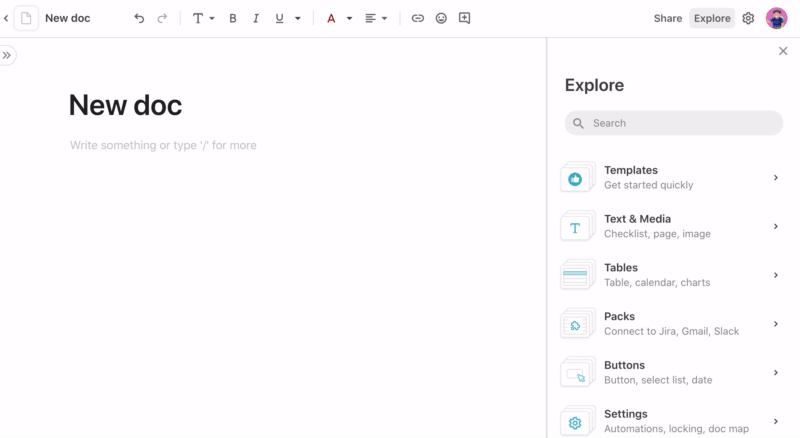Skip to content

Here at Coda we run some pretty efficient meetings. One of our strategies is using a “dory”—named after the always-asking-questions character we know and love from Finding Nemo—for questions at the bottom of every topic writeup. The dory gives us a place to ask questions and pose concerns about whatever topic is up for discussion before going through the list to expand on our thoughts during the meeting.
There is a key factor to this strategy though that really makes it work: voting, which allows meeting attendees to easily prioritize their discussion. That’s not to say any questions are abandoned—folks are encouraged to continue answering questions after the meeting ends. And since the meeting doc is shared, everyone has a chance to review the responses.
Meetings can move quick.
Meetings can ramp up quickly. Read the write-up, add questions, vote on other questions, and begin the discussion—all in a span of 5 to 10 minutes. During that time, you’ll see a flurry of new rows, blinking cursors, author avatars, and increasing vote counts. The process feels busy and sometimes a bit overwhelming.
On more than one occasion, I’ve found myself jumping to questions that were already receiving votes in case there wasn’t enough time to read all of the proposed topics. I’ve also hesitated when it comes to submitting my own questions, wondering if others are watching what I was typing while I was still trying to form the thought.
Small customizations go a long way.
Reflecting on meeting participation, I wondered what would happen if we could remove the rush, the hurriedness. So, I experimented with our current dory template.
First, I added a checkbox control. I also added an If() statement to hide author avatars while adding topics and voting was taking place. The same statement shows avatars when the checkbox is clicked so we would know who to call on when presenting.
With my customizations in place, I shared the idea with our People & Ops team to see if there was anything I had missed and to gauge interest. If you’re wondering if Coda is a supportive and encouraging place to work, here’s the response I received to just pitching an idea out of the blue...


The next step was to share the idea with all of Coda. We have a Diversity & Inclusion Slack channel where we share links, resources, and ideas to consistently learn more and work on improving. Because the unbiased voting idea is based around helping everyone in the company feel more comfortable participating, this channel felt like a particularly good place for a wider introduction. Many people in the company jumped in with great ideas and feedback, from my teammates on support to our CEO.
We brainstormed and commented on ideas, drafted a few more versions of the dory with various tweaks, and quickly settled on launching a drag-and-drop template. And based on the great feedback from everyone involved, there are now two options for the table, one to hide author avatars and another to hide vote counts and sorting.


We added the “Unbiased Voting” drag-and-drop template to Coda and gave it a test run during a planning meeting. You can find it in your doc by typing /unbiased voting.
Making a big impact by solving everyday problems.
Here are a few of the responses I’ve received since publishing the template:
I LOVE IT. So easy to use and am now coming to terms with the fact that I definitely looked at badge numbers and authors to prioritize reading ideas, and this is helping me read the whole table!
I’m loving not having an author for voting! I keep thinking, “I wonder if the person who said this has a vested interest in this area…either for the work required, interactions with users, etc.” It’s nice to come at this unbiased.
Yes agreed as well! Beyond bias reduction, it’s also a simpler table to consume as I’m going through questions and voting.
Everything going on in the world today can feel pretty overwhelming. There are some really big problems to solve and it can be difficult to figure out how and where you can have an impact.
For me, finding some everyday happenings that could be improved is where I feel I can have the most impact. Small steps that add up to big strides. We’re working on a lot of things here at Coda and we care about the small steps too.
Want to print your doc?
This is not the way.
This is not the way.

Try clicking the ··· in the right corner or using a keyboard shortcut (
CtrlP
) instead.